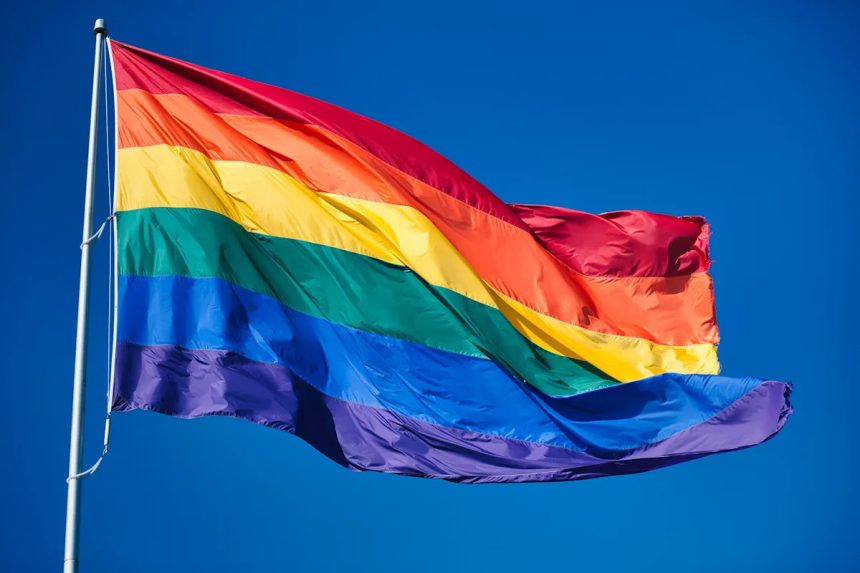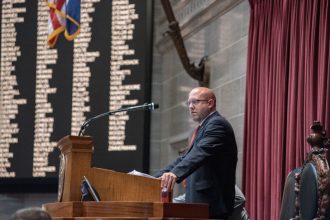Public domain photo.
A former employee of the Federal Bureau of Investigation has filed a lawsuit saying he was wrongfully terminated for displaying a pride flag at his desk, arguing that the flag had been given to him by the FBI and his firing was a violation of his First and Fifth Amendment rights.
David Maltinsky filed his complaint Wednesday in the U.S. District Court for the District of Columbia against the Department of Justice, FBI, Attorney General Pam Bondi, and FBI Director Kash Patel.
In the complaint, Maltinsky describes how he wanted to be a Special Agent with the FBI since he was 11 years old, in the aftermath of September 11, 2001. He started as an intern at the FBI’s Los Angeles Field Office (“LAFO”) in 2008, started working there full time in 2009, and “was promoted to serve as a staff operations specialist, an intelligence role in which he supported the FBI’s efforts to prevent and combat cyber-attacks against the United States” in 2014.
Maltinsky, who is gay, earned several awards during his employment related to his support for “the FBI’s then existing diversity initiatives,” including the 2020 Director’s Award for Excellence – Outstanding Service in Diversity and Inclusion, and in 2022, “the Attorney General’s Award for Equal Employment Opportunity, DOJ’s highest award for performance in support of the Equal Employment Opportunity Program.”
This led to the pride flag he had at his desk, after LAFO leadership gave him two pride flags that had flown from the flagpole in front of their offices, and he displayed one at his workstation along with a small placard describing where it came from.
In 2025, Maltinsky had been with the FBI for over 16 years, “applied to and was accepted by the FBI’s Special Agent training academy at Quantico, Virginia,” and submitted to and passed a background check, the complaint continues. Before relocating to Quantico, he cleaned out his workstation at the LAFO, including removing the flag and placard.
He had finished 16 of the 19 weeks of the FBI Academy’s 19-week training program on Oct. 1 when he was given a letter from Patel firing him, accusing him of having “exercised poor judgment with an inappropriate display of political signage in [his] work area” at the LAFO.
“In short, Patel fired Maltinsky for displaying a pride flag at his workstation that had been flown by the FBI at the LAFO and then given by the FBI to Maltinsky,” the complaint argues.
The complaint further points out that the DOJ and FBI “routinely permit employees to display signage associated with matters of public concern in their personal workspaces,” including “signage that alters the traditional colors of the American flag to include a blue line and which is associated with support for law enforcement,” the Gadsden flag, “a Revolutionary War era flag that has come to be associated with a right-leaning movement,” and the “so-called Punisher iconography, a graphic image of a skull that has come to be associated, in part, with anti-government militias.”
“Defendant Patel himself distributes challenge coins featuring the blue line, the Punisher symbol, and the Gadsden flag,” the complaint notes, and argues that Maltinsky was following all rules:
Maltinsky’s display of a Progress Pride flag did not violate any FBI rules, policies, or procedures—and instead was approved by his leadership. The display was not inherently partisan nor disruptive in any way. Nor was Maltinsky’s speech made pursuant to his official responsibilities within the FBI, or made to convey a government created message, or made to fulfill a responsibility created by his employment. Instead, Maltinsky displayed a flag provided to him by the FBI at his own personal workstation, speaking entirely as a private individual and with the permission of his superiors.
The complaint alleges that the defendants’ actions “harmed Maltinsky by infringing upon the exercise of his constitutional rights, damaging his reputation, depriving him of his status as an FBI employee in good standing, eliminating his primary source of income, and depriving him of health insurance and other government employment benefits.”
Six causes of action are listed in the complaint: First Amendment violation of retaliation for protected speech, First Amendment violation for viewpoint discrimination and infringement on expressive association, two counts for Fifth Amendment violations for equal protection, one count for declaratory judgment, and one for a writ of mandamus “commanding Defendants to return him to his most recent position and not remove him from federal service without following lawful procedures.” He’s seeking declaratory judgments his constitutional rights were violated, an order requiring the FBI to “immediately retroactively reinstate” him, an “award of backpay, benefits, and other monetary and administrative relief as appropriate, plus prejudgment interest,” and attorneys’ fees and costs.
Maltinsky was interviewed by CBS News’ Scott MacFarlane on Wednesday about the lawsuit.
“I wasn’t surprised. I was definitely disappointed,” Maltinsky said about being fired. He said he had heard he was “on a list” of employees who were being targeted, and said his termination was to “send a chilling effect throughout the men and women at the FBI — it was effective,” as many had removed pride flags from their desks.
“We’re not the enemy,” said Maltinsky, about himself and other LGBTQ colleagues. “We’re not some political mob. We’re proud members of the FBI, and we have a mission to do.”
The FBI declined to comment on the lawsuit.
The post Ex-FBI Employee Sues After He’s Fired for Displaying Pride Flag the FBI Gave Him first appeared on Mediaite.









